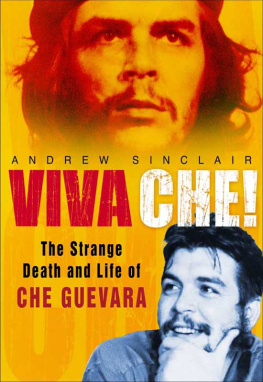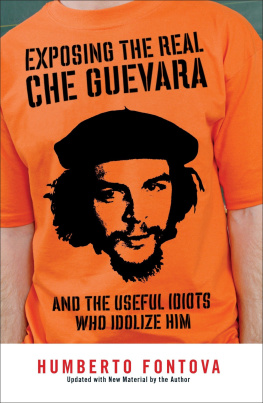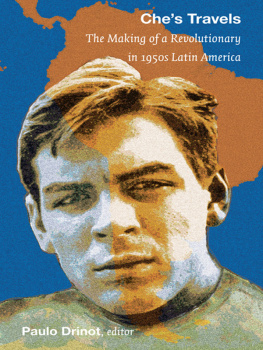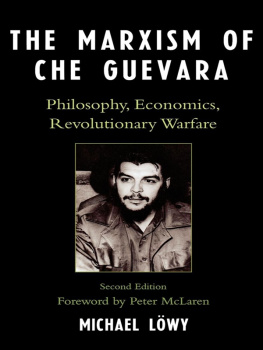Viva
CHE!
VIVA
CHE!
The Strange Death and Life of
CHE GUEVARA
ANDREW SINCLAIR

First published by Lorrimer Publishing Limited, 1968
This new revised edition first published in 2006 by Sutton Publishing Limited
The History Press
The Mill, Brimscombe Port
Stroud, Gloucestershire, GL5 2QG
www.thehistorypress.co.uk
This ebook edition first published in 2013
All rights reserved
Andrew Sinclair, 1968, 2006, 2013
The right of Andrew Sinclair to be identified as the Author of this work has been asserted in accordance with the Copyright, Designs and Patents Act 1988.
This ebook is copyright material and must not be copied, reproduced, transferred, distributed, leased, licensed or publicly performed or used in any way except as specifically permitted in writing by the publishers, as allowed under the terms and conditions under which it was purchased or as strictly permitted by applicable copyright law. Any unauthorised distribution or use of this text may be a direct infringement of the authors and publishers rights, and those responsible may be liable in law accordingly.
EPUB ISBN 978 0 7509 5648 2
Original typesetting by The History Press
Contents
Acknowledgements
W e are especially grateful to the following people who contributed much time and effort to the project: Denise Alexandre, Jorge Bolaos, Alberto Korda, Osvaldo Salas and Cecil Woolf.
We would like to thank, for their help and suggestions, Tofilo Acosta, Ana Ortega Cceres, Marysa Gerassi, Luis Korda, Verney Leech, Derek Lindsay, Ellen Maslow, Rafael Morante, Roberto Fernndez Retamar, Guido Sanchez, Marie Schbko, Daniel Schechter, Ral Lazo Sotolongo, Jorge Timossi and Ed Victor.
Our thanks are also due to Casa de las Amricas, the Cuban Embassy in London, Comision para perpetuar la memoria del Comandante Ernesto Guevara, Revista Cuba and Departamento de Prensa Extrangera (Ministerio de Relaciones Exteriores).
The piece by John Berger is reprinted by kind permission of New Society; the poem by Adrian Mitchell is reprinted by kind permission of Peace News; the piece by OZ Magazine is reprinted by kind permission of the editors; the song by Alasdair Clayre is included by kind permission of Albermarle Music, Ltd.
Other people have kindly helped us in many ways too various to specify. To all of these, our grateful thanks. Finally, we wish to thank all those who wrote in or sent contributions that we were unable to publish for lack of space.
Masa
At the end of the battle, when the fighter was dead,
A man came up to him and said:
Do not die. I love you so.
But, alas, the body stayed dead.
Two men came near him and repeated:
Dont leave us. Be brave. Come back.
But, alas, the body stayed dead.
Then twenty, a hundred, a thousand,
Five hundred thousand came and begged,
Can so much love do nothing against death?
But, alas, the body stayed dead.
Then millions came up; he was surrounded.
And all of them called: Brother, dont leave us....
But, alas, the body stayed dead.
Then all the men on earth came round.
The sad body saw them and was moved;
Slowly, he rose and kissed the first one,
And then began to walk....
CSAR VALLEJO (Peru)
(18951939)
Notes on the Life of
Ernesto Che Guevara
Ernesto Guevara de la Serna was born in Rosario, Argentina, on 14 June, 1928. His parents were Ernesto Guevara Lynch, civil engineer of Irish descent, and Celia de la Serna, of Spanish descent. This was a middle-class family with strong left-wing and liberal tendencies. The Guevaras were freethinkers, admirers of Jos Mart, and on the side of the Republicans during the Spanish Civil War.
Ernesto was the eldest of five children; after him came Celia, Roberto, Ana Maria and Juan Martin, in that order.
JOSE AGUILAR: In 1937, my family fled from Spain to Argentina where, at Alta Gracia, a city in the province of Crdoba, we met the Guevaras. All the children became friends and played together every day, really almost living together. The Guevara children were very brave at games and sports, and we were a bit frightened of them. Ernesto like rough games very much; I remember one of his brothers, Roberto, telling me how Ernesto would jump across three feet of space from the third floor of their house to the next, just for kicks, and then make fun of the other chileren because they did not dare do the same thing.
In those days, our favourite writers were Jules Verne and Alexandre Dumas.
Later, when Ernesto started high school in the city of Crdoba, he studied English; but he always liked French better. He studied French with his mother and liked to read French poetry. He was also extremely fond of Pablo Nerudas poems, and would spend days reciting some of them aloud.
My father, who was a doctor, was upset by the fact that Ernesto read the works of Freud at the age of fourteen and that his parents did not mind.
FERNANDO BARRAL: I met Ernesto in 1940. He was already incredibly sure of himself and totally independent in his opinions. He was very dynamic, restless, and unconventional. I think I secretly envied him for his energy, his self-confidence and his boldness; the most striking thing about him was his absolute fearlessness. The way he played rugby also impressed us, and what made him so different from the rest of us was that he seemed much more tough.
ALBERTO GRANADOS: I met Ernesto in 1941 when he was at high school with my brother Thomas. I was at University at the time. We Crdoba students, along with students from other universities, had gone on strike against the abuses committed on the university campuses. That was the reason I was arrested and taken to Crdoba central police commissariat. Rather than arrested, I should say kidnapped, for we were not tried. At that time my brother Thomas used to bring me food in jail, as they didnt feed us. One day, Ernesto, his school friend, came along. I spoke with the two of them and explained that the high school students should demonstrate in the streets so that people would know how we were being treated. What amazed me was young Ernesto Guevaras reaction to my proposal. He answered, Nothing doing, Alberto. Go out onto the streets so that the police can hit us with their clubs? Nothing doing. Ill go and demonstrate only if you give me a gun.
CHE: At fifteen, a man already knows what he wants to die for, and he is not afraid of giving his life, if he has found an ideal which makes this sacrifice easy.
ALBERTO GRANADOS: In spite of the asthma he suffered from all his life, Ernesto was a sports enthusiast, something we had in common; an education which alternated between Baudelaires poetry and sports forged him spiritually and made him physically fit. From then on, he became involved with travel and action. He was at high school and I was at university; but as he enjoyed our company and as we were impressed by his intelligence and the depth of his knowledge, we became great friends. I used his fathers library a lot. Ernesto was the main reader, and I came second. Without a doubt, he had an intellectual sense which, from childhood, enabled him to distinguish himself in all aspects of life. He enjoyed going out with us on trips to the country, learning many things that were later useful to us on our motorcycle trip across the continent. Years later, those experiences were necessary to him as a guerrilla. He learned how to set up a tent with few resources. We learned all of those things without ever thinking of future possibilities: it was just a healthy outdoor way of life that allowed us to get away a little from the ordinary routine of the student and city-dweller.
Next page





